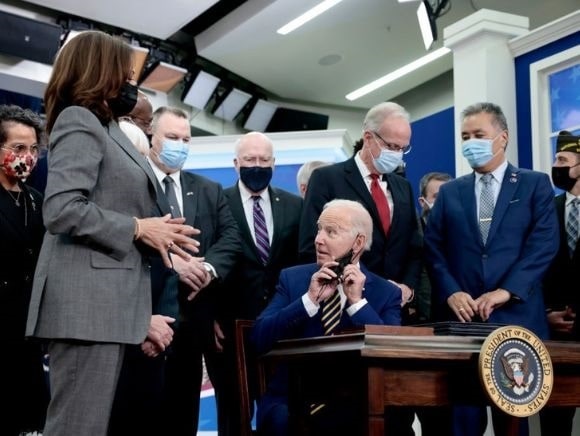Honoring and caring for men and women veterans who have served and become America’s wounded, ill, and injured is society’s obligation. On June 7, President Biden signed into law nine bills addressing US military veterans. The White House signing ceremony was a door opener for more expensive and targeted veterans’ healthcare legislation currently being debated in the Senate.
The chairman of the US Senate Committee on Veterans Affairs, Sen. Jon Tester (D-MT), as well as prominent Republican Sens. John Boozman (R-AR), Susan Collins (R-ME), and Joni Ernst (R-IA) attended the signing. Of the nine bipartisan bills, three are intended to enhance healthcare for veterans by opening the aperture for treatment to those veterans exposed to toxic substances. The three bills expanding treatment for veterans’ healthcare focus on access to early mammography detection of breast cancer and other cancers caused by radiation and poisonous fumes. In his remarks, Mr. Biden said:
“Less than one percent of the population risk everything to defend our nation and our values and everything we hold dear. And you know, the 99 percent of us who don’t, we owe them, we owe them big…In the State of the Union, I talked about needing to talk about the burn pits that incinerate waste of war. Tires, poisonous chemicals, jet fuels, and so much more I won’t even mention.”
[substack align=”right”]However, the legislation to address specifically what the president was referring to was not among the bills he signed. Instead, legislators hope to pass the bill within the next few days to help and compensate those who have become ill because they were living and working near burn pits. Burn pits were large holes dug in the ground in Iraq and Afghanistan, where soldiers burned various types of refuse, resulting in acrid and harmful fumes. That legislation is HR 3967, Honoring Our PACT Act of 2021, named for the Ohio National Guardsman Sergeant First Class Heath Robinson, who died in 2020 of lung cancer attributed to burn pit fumes. “We want to try to get it done soon. The quicker, the better, to give certainty,” Senator Tester said, according to the Missouri Independent. From a procedural perspective, one of the stumbling blocks is an amendment reclassifying the PACT Act from mandatory to discretionary spending. Mandatory spending bills are funded in perpetuity unless legislation is passed to end or modify the spending bills. Discretionary budgeting bills are passed annually just as Veterans Affairs spending gets approved every year. Discretionary spending is much more appealing to Congress and protects taxpayer equities better because it allows yearly review. As written currently, the bill “lessons congressional oversight of the VA [Veterans Administration],” a view held by Senator Jerry Moran (R-KS), lead Republican on the Veterans Affairs Committee.
The cost of the PACT Act is a hurdle. The Congressional Budget Office scoring of the bill showed current appropriation estimated spending would be $390 billion over ten years. Additional spending associated with the PACT Act would be an additional $277 billion for a total of $667 billion from fiscal years 2022 through 2031. Though a bipartisan legislative effort, the bill is not without its detractors. A significant criticism of the PACT Act is the window of eligibility associated with receiving VA compensation.
There are 23 medical issues – types of cancer, bronchitis, and leukemia — for veterans who served in 17 countries during specific times of conflict, such as Iraq, Operations Desert Shield/Storm, the Gulf War, and Afghanistan following the 9/11 attack. At the discretion of the VA administrator, other countries may be added.

(Photo by Aimee Dilger/SOPA Images/LightRocket via Getty Images)
“The bill would relieve veterans of having to prove that any of those conditions were linked to their service in order to get VA coverage for them,” Christian Britschgi reported in Reason.com. Instead, veterans would be covered under what is called “presumption of service connection.” If the appropriation is mandatory, the top line on this expenditure could grow endlessly.
Americans must take care of veterans disabled or made ill serving in the military to defend the nation. Unfortunately, in times past, that hasn’t always been the case. Bipartisan bills like those signed by Biden and currently in the legislative process are essential to meet the healthcare needs of veterans. However, in the zeal of the moment, deference toward veterans’ needs must be tempered with reason and a sense of responsible stewardship.
The views expressed are those of the author and not of any other affiliation.




